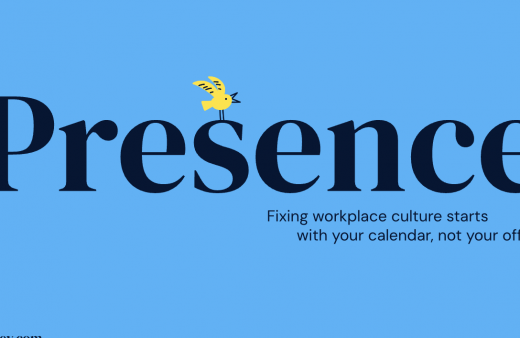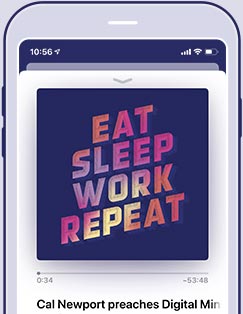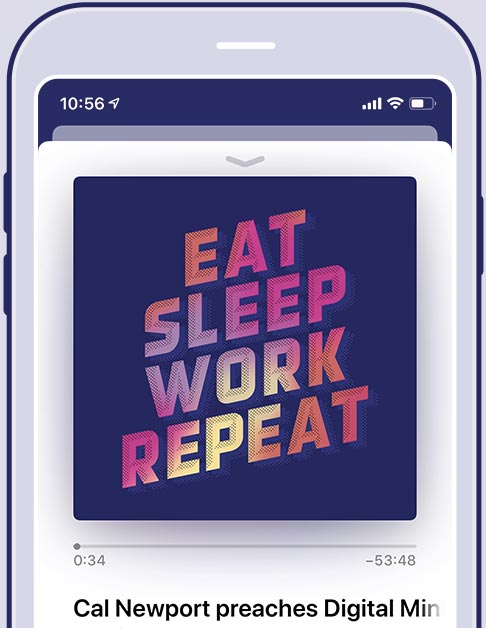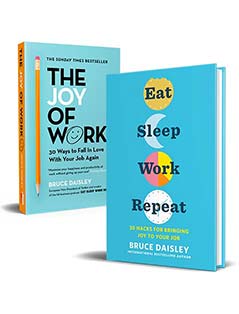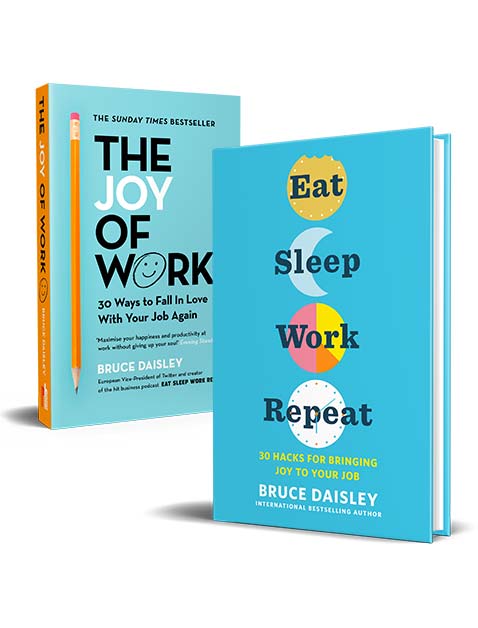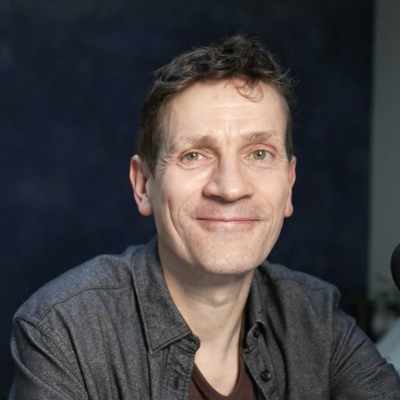Psychological safety – setting the record straight
Ellen is away this week – we were working hard to squeeze an elite guest in.
Amy Edmondson is the most renowned organisational psychologist in the world. In other words she’s looked to more than anyone else for the answers of how to fix work.
In this in depth discussion she talks us through what she understands by psychological safety, how any of us can create it and what she believes the best team structure is to achieve it.
We’re also joined by Octavius Black, founder of Mind Gym, who provide behavioural science based interventions for lots of the biggest companies in the world.
Amy’s new book is The Right Kind of Wrong
This is the context for the question about the state of organisational psychology – headlines of data fraud. As Amy explains this is a story that seems to be unique to lab work with specific individuals, not a reflection on the whole space.
Transcript
This transcript is generated by AI. If you find any issues with it please email transcript@eatsleepworkrepeat.com
Bruce Daisley
Thank you so much for joining us, Amy and Octavia. I wonder if, to kick off, you could just introduce I mean, how dare I even ask this? But introduce who you are and what you do.
Amy Edmondson
Well, I’m a researcher at heart, a researcher and a teacher at Harvard, where I’ve been for 27 years, and I study people and organizations, how people interact in organizations and how that shapes the results that their teams and their organizations get.
Bruce Daisley
Octavia do you want to introduce yourself.
Octavius Black
Yes, thanks, bruce. I’m the CEO and co-founder of a business called Mind Gym. We’re behavioral scientists in a different form because we look at how to apply it in the world of work. So we work with most of the FTSE 100 companies, most of the S&P 100 companies on areas like culture, leadership and performance. We’ve had about 5 million people go through our programs now, so we’ve got quite a lot of data about what does and doesn’t work.
Bruce Daisley
Amy, to kick off, you mentioned this organizational psychology and really, certainly from a lay person’s perspective, you’ve contributed as much to that field as anyone. What do you think this state of organizational psychology is right now? Is it in good health? There’s been a couple of bumps in the road, I think big stories that have maybe questioned whether we can always trust this as a science. What do you think the state of organizational psychology is right now? Wow, that’s a big question.
Amy Edmondson
I think the state of organizational psychology is essentially quite sound and healthy, in a large part due to the work of people like Octavius, where I think there’s a very short lag between discoveries and the really good work to implement them, to start experimenting, because there’s a gap between learning something that works in the lab or even from field research and then well, hold on. How would you change things, how would you help people put this to good use? That kind of action, research and implementation, is an ongoing learning journey in its own right. I think enough people understand and appreciate that basic idea that it makes the work quite relevant and quite healthy. There are the occasional headlines that you will see, largely related to lab studies rather than field research. I guess there’s a lot we could say about that, but I don’t think it’s the heart and soul of the matter by any means.
Bruce Daisley
Yes, Look, it’s in the field that we’re most interested. Kick us off. The way that you’ve revolutionized this space is by bringing our attention to this idea that I think all of us have now become familiar with. All of us reflect on whether we’ve created it, whether we’ve been the cause of the destruction of it, this idea of psychological safety.
Amy Edmondson
Yes, let me reframe it or rephrase it as psychological safety essentially is about creating a learning environment, an environment where people, despite the interpersonal challenges and impression management challenges, are willing to lean in. They’re willing to speak up with mistakes and problems and ideas and a request for help. They’re willing to do those interpersonally risky behaviors because of what’s at stake, because they care enough about the project, the customers, their colleagues, what have you that they’re willing to take those interpersonal risks for, in a sense, the greater good, one-winded way of saying a learning environment. A learning environment is not natural, but it is doable.
Bruce Daisley
Okay, there’s a critical thing there. I was really interested just if you had a specific definition of psychological safety, because that learning environment and it not being natural actually is a really interesting point that we can move on from there Just quickly. Just how do you define?
Amy Edmondson
it A belief that interpersonal risks can be taken without negative consequence.
Bruce Daisley
You said there wow, what a fascinating idea, the idea that a learning environment isn’t a natural environment. Wow, Because probably I think we all flatter ourselves to some extent that we’ve created this environment that people can learn what gets in the way of a learning environment?
Amy Edmondson
Learning, knowing and impression management, the desire to look good, the desire to be right, the kind of almost automatic confidence that we are right, at least in our take on a situation. We assume we are seeing reality in all its glory. We don’t think kind of spontaneously oh, I’m seeing reality filtered through the lens of my background, my biases, my beliefs. No, we think we see reality. That works out pretty well for us most of the time, until we sort of encounter someone who oddly sees it differently. Then we assume very quickly well, they must be missing something, surely not I?
I know I’m exaggerating to make the point, but little kids, very young children of course, are naturally learning and curious and trying all sorts of things, and many of them don’t work out. That was interesting. Let me try this instead. Whereas late stage school children and then working adults, it’s all but second nature to want to be right, to believe you are right, to believe you see reality, to kind of close down to disconfirming evidence. Again, not deliberately, not at all, but just by way of expertise, by way of experience.
Bruce Daisley
Obviously you talk about the desire to avoid appearing obstructive, that we don’t raise questions, the desire to avoid appearing ignorant, that we don’t raise questions. All of these things, to some extent, seem to be about the preservation of status. Is status an important subtext to psychological safety? Yes, it is.
Amy Edmondson
Status and or reputation. I want people to think I’m smart, capable, helpful, positive. I don’t want them to think I’m incompetent, intrusive, negative, etc. We naturally and we’re very skilled at it one of my wonderful mentors, chris Argers, had this term skilled incompetence. We’re skilled at being incompetent at learning. We’re skilled at impression management. We will hold back without even knowing we’re holding back when we perceive there’s a possibility that you won’t, the other person or people won’t think well of us.
Matt Cook
if we do that, then I’m interested about this idea of the learning environment not being natural. Where my brain started to go is is it not natural in certain contexts and it’s more natural in others? So you talk about maybe school kids, the environment and perhaps also just the brain development at that stage. But the environment certainly makes it more natural. I’m wondering whether it’s the business structures, in the ways we set those up, make it less natural. Do you see that?
Amy Edmondson
Precisely precisely, and I wasn’t as clear as I should be about that. Right, it’s, it’s it’s. We drive learning out. You know deming wanted us to drive fear out of the organization. Instead, we drive learning out of the organization. Of course, not all the time, but we do this by the nature of our systems. Just this morning, at a meeting with some HR leaders of, someone was saying this is all well and good and our performance management systems still penalize people for having, you know, spoken up about a failure, for having, you know, try to share that information so that others want. You know we’re vulnerable to doing the same thing. We value that, we want that, and yet our performance management system will, will penalize people for it.
Matt Cook
So that is a way of engineering learning out yeah, there seems to be almost a disconnect Between what people want and then the systems they’ve created and how they’re reinforcing certain behaviors. Certainly I imagine you speak to most leaders and they want innovation, they want risk taking and yet the signals that the culture sends back up that well, it wasn’t okay to to fail to make mistakes. Do you see kind of the ad business need them to create habits and rituals to reinforce psychological safety and failure.
Amy Edmondson
Yes, we love risk taking, but they should all work out, say what that? Just it’s illogical. But I think many organizations are full of illogical practices and habits.
Bruce Daisley
Could you talk a little bit more how you might seek to create a psychologically safe environment? I was really struck the idea with of blameless reporting when you talked about forward. But Are there other tricks? Are there other things that you can seek to facilitate being a psychologically safe environment?
Amy Edmondson
Yeah, you know, can, conceptually, I talk about three things that are, you know, you can think of them in a way is before, during and after. But that’s not, that’s a little oversimplified. But the three things, the three categories are one is reframing the work, you know, calling attention to the actual nature of the work we do. You know why it’s uncertain, it’s new, it’s interdependent. You know all of those features of the work that literally require us to be speaking up and leaning in or we won’t do it well, so refer to those kinds of things early and often and then proactively invite Voice, ideas, questions, concerns into the mix, largely through good questions, by asking questions you know, what are you seeing, what are we missing, what other ideas do you have? And also by creating structures that are Sort of set up to illicit good thinking, whether those are after action reviews or brainstorming meetings or just simple rounds for each Discuss. You know what we see, what we think, but just the scaffolding that makes it a little easier for people to engage and a little harder for them to sit it out. It’s, you know, it’s almost, it’s almost. It’s important to lower the cost of voice, but it’s also important to raise the cost of silence.
And then and then finally, there’s the practice of you know how do you respond and how do you respond to bad news, how do you respond ideas you don’t like, and it ought to be in a learning oriented way. So you mentioned blameless reporting. Blameless reporting is a policy that says we really want to hear from you, we really want to know the things that are going wrong so that we can make them better. And it really is. It takes two of those boxes, it’s, it’s an invitation, here’s a system, and we facilitate, we made it easy for you to give us data that we didn’t otherwise have. And blameless, the response to your input will not be Problematic. We won’t penalize you for you know, for participating in this, in this reporting process. So it sort of does both.
Bruce Daisley
I think when you said that the new chief executive Ford introduced blameless reporting, I think you said the the. The moment from when someone spoke up to the resolution Was like 15 seconds and it was just. It’s incredible how this can not feel like a viable branch. I don’t know if you can tell the story, yeah.
Amy Edmondson
Yes, it’s, it’s. It’s the story of Alan Mulally who about a decade ago little more, came in and Ford was in, you know, just tremendous trouble really, you know, on life support from an economic perspective at that point. And his belief was that it had sound. You know, the company had sound products and the possibility to really turn itself around. But it would. It would require truth telling and it would require especially well all the way through, but especially in that executive committee, that top management team, that they meet weekly and rigorously and they go over the data, what’s happening and why. And he asked his direct reports to use a simple color coding scheme, you know green for for good, yellow for caution and progress, and red for problems. And lo and behold, everything is green. So he finally, you finally, really pushed harder and he said listen, we’re we’re on track to lose 17 billion dollars this year.
What isn’t going well? Notice how he’s reframing. You know can’t be all green out there because 17 billion loss, right. And then he asks what I would call a good question what isn’t going well? Finally, someone reveals very serious problem with the new vehicle launch and Everybody, of course, for a moment thought that guy was going to get fired on the spot. Course not. That would not have been a constructive, learning oriented response. But what did happen was he said thank you for that clear line of sight, how can we help? And then three other executives Spoke up with I think I’ve seen something like that before here, there, etc.
I have an idea that you might try. And another thing I have a bunch of engineers I’m happy to send to that plant tomorrow. I’m happy to send you a message that you’re going to get that conversation, which didn’t fix the problem, but it started. The fixing Took 12 seconds, according to Malali. Right, so it’s. The people think, well, if we have psychological safety, it’ll take too long. The truth is, it takes too long when we don’t, because that having that conversation, which took 12 seconds, took To initiate, you know, several weeks before people were willing to have it. That’s wasted time.
Bruce Daisley
I love the fact that you frequently give examples that are so Immediately in the in the mind. Vw diesel gate, boeing air max, you know the rust film set. These things are stories that have reached national international news. Is there anything in common between them? Because I think you’re really sharp. Illustrating the absence of psychological safety is something that underpins all of these people have known there’s something wrong, but they haven’t spoken up. Or what lessons would you draw from avoiding being the next Boeing Air Max?
Amy Edmondson
Well, you’re absolutely right. What they all have in common is that there were people, experts even who had insights or information that they did not feel able to share for whatever reason, and had it been shared earlier, we might have had a different outcome. So, that’s what they all have in common.
Now it becomes almost extraordinary to think how common you know and how much this is a recurring phenomenon in organizations around the world, like why do we not do better?
And I think that takes us back to our notion of Matt’s notion, really, of organizations often inadvertently set up their practices and structures and even leadership examples in a way that discourages sharing the truth and it’s obviously problematic, but it’s hard to sort of see it in a real time in the midst. You step back and you tell these stories and it’s loud and clear and you say, well, why would anyone do anything like that? But they do it in part because of outdated mental models, I believe, mental models that say you know, people try hard and do their jobs right, they’ll get the results full stop. And they don’t take into account that we live in a volatile and certain complex, ambiguous world. And you know, sometimes people will try hard and stuff happens and it wasn’t their fault, it was reality itself sort of intervening. Other times people will mail it in and get lucky and have good performance. So we have a sort of unscientific mental models about cause and effect in the modern world.
Matt Cook
This mental model piece is really interesting because one of the places I wonder if there’s a disconnect is that I imagine most managers and leaders would say they create an environment of relatively high psychological safety. I can’t imagine most would admit or know that it’s low and I’m responsible for that. So it seems like there’s a bit of a disconnect and we have to almost proactively create interventions and I’d love yet to hear whether there’s some more from you, amy, and also Octavius, having worked practically within companies. How do we start to design more interventions to reinforce psychological safety?
Amy Edmondson
Let me say just a couple of quick things and then hand it over. But I think that you’re right. I mean, most people don’t think, oh, I set up an environment of low psychological safety. But many people, either explicitly or implicitly, believe that what motivates people to do a good job is fear right, and fear of the consequences. And they fail to appreciate that fear actually narrows cognition and makes it hard to do really hard knowledge work. So they may not set out to kind of create fearful environments, but they have this underlying thing.
Well, isn’t that the way that people will actually work hard, which is not really a very productive mindset? But to build it and to help, I think it does start. Your question implies and I think it’s true, it does start with a little bit of self-awareness. I mean, you have to help people see they have good intentions nearly all the time, but help people see, like Martin Wintercourt and CEO of DW assumed that by being really tough and really direct he’d get the result he wanted, which was this beautiful vehicle that would be environmentally sound and all the rest, he did not realize that the impact he actually had was they wouldn’t hear about problems and that ultimately they would. Engineers would feel the only way to survive was to develop software to cheat the regulators rather than tell the truth of the chain of command. But we can help them, I think, with that self-awareness and then with just some of these leadership practices that really create the learning environment.
Octavius Black
I totally agree with Amy and I think a really good example of this is the story of Microsoft. In the previous regime of Steve Armour, the performance management system was described in vanity fairs like the Hunger Games. You were forced into a distribution and the bottom lot went and people were actually trying to find the worst person they could to work with because increased their chances of getting a better rating at the end, which was obviously completely counterproductive for the business.
And when the statistic came in it was a transformation of the performance management approach which we were delighted to be involved with, and all of that was about removing the sense of ratings and scoring people, but that wasn’t the important bit.
It was actually what did matter, what people were recognized for, with three things. One was how much they borrowed or used other people’s work in the work that they did. The second third was how much other people used their work, and only one third was what they actually achieved themselves. So that helped set a very different cultural time. But the real magic and Amy’s talked about this extensively is in the role of the manager, and really we set up managers to fail.
I think this is a real problem in business across the world. That is the problem in society. If you look at films about managers, you’ll see horrible bosses so good they made it twice and the devil was brother but you won’t find a film that makes a hero of the middle manager. But actually the middle manager is the people that make organizations work and successful, and so what was really brilliant about what Microsoft did then was help educate their managers about how to have the right kinds of conversations, how to avoid being an innovation stifler and become an innovation nourisher. What are the ways and behaviors they can act in day to day that allow people to experiment?
Matt Cook
and to fail and to learn.
And I’m thinking about when you talk about managers. There’s a little bit here in terms of the shift to a more coaching mindset. So how do we enable managers to facilitate environments where people can innovate and can fail? I think this is one of the most challenging asks of a modern manager and certainly kind of a big shift we’ve seen recently, because the manager’s performance typically is tied to their team members’ performance, so it’s not only tempting to step in and micromanage. You’re often kind of incentivized to step in and micromanage rather than allowing that space to potentially fail. I’d love your input on how we can help managers adopt more of a coaching mindset, but then also kind of to know when it’s appropriate to and also when actually to take more of a manager or mental role.
Amy Edmondson
It’s such a beautifully put idea and, in a way, micromanaging is like a short-term solution to an ongoing challenge. If I jump in right now, I might be able to do it better than you, but I have literally gotten in the way of developing you as a resource who can do this for us longer term, and so often we have to explicitly take the kind of short-term hit to get the longer term gain. Now, that’s not. Micromanaging Doesn’t mean just go away on vacation and come back and see what happened. It means being very thoughtful about what do I need to do to help you develop and do great work? And there may be things I’m not providing as a manager that I need to start providing, but they are not doing your work for you.
Bruce Daisley
There seems to be a growing trend. We’ve seen it in politics, but we’re also in the business leaders who transcend and become something more. I’ve never explained, never apologized, this almost opposite of psychological safety. In a former life I worked at Twitter and a lot of my colleagues were still at Twitter recently when Elon Musk took over and he gave what I would regard as a prospective case study for what I’ve seen Amy work on. He gave a directive which was you need to ship this new product, the blue tick verification. You need to ship it in 10 days. If you don’t do it in 10 days, I’m going to fire you all. Now that’s got enough of the VW diesel gate to it.
I recognize the characteristics and yet there’s a new biography out of Elon Musk. He’s celebrated as the business leader of our generation. I just wonder if there’s a conflict between the icons that we seem celebrated for being decisive, for being knowing themselves, and what we’re recognizing that actually some humility and some willingness to be open for questions is actually the, the, the source of greater success. How do we square those things? How do we make something which feels so gentle and eagolous feel appealing to a wider audience?
Amy Edmondson
Wow, where do we begin? I don’t want to begin to the specifics of musk per se, and maybe he is being celebrated as certainly as a business leader of our day. That says a lot about our day. Whether or not I would have, you know, willingness to predict future success for Some of the enterprises that he’s leading is another question. And and and for me, I, you know, I think erratic behavior, unpredictable behavior In a leader, just in general you won’t name names and and sort of fear as a management tool is ultimately unlikely to succeed very well in a in a certain complex interdependent world.
I mean, we can, we can put up against that description Alan Mulally, and and and and his results, and he’s not unique, but the kind of the steady, the here’s where we’re going tough, clear, inviting, confident that with all of us working together we can do this or such a on the Della. I mean there’s, there’s plenty of counterparts that just make more sense for a world where uncertainty is high, and and and also a world where the stakes are high and we need, we need a steadiness, we need a learning orientation, we need a willingness to do what it takes to inspire and gauge others to achieve amazing.
Octavius Black
I just echo that. I think the you have masquerade potentially. Steve Jobs famously allegedly said that if you don’t come on Saturday, then bother coming on Sunday. And there’s all this kind of match, a chat. These are extreme outliers. They won the generation. What I mean is describing is actually what makes successful business leaders say if you want to be a successful business leader, you need to be emotionally self regulated.
We’re just about to publish a new research report on well being. I’m looking at the five drivers of culture that most affect well being and one of those is certainty. And the more we feel the level of certainty, the greater our self esteem and so forth increases our mental and physical particularly mental health. But what happens is quite often people are unaware. I come back to our managers what they’re doing that’s creating uncertainty. Your boss says to you know, bruce, can I see tomorrow for five minutes, like Christ, what I done? I’m going to sleep. Your boss is Bruce, I love what I report, I love to hear a bit more about it. Can have five minutes to tomorrow. It takes to go from uncertainty to certainty. But creating certainty, emotional self regulation, these and other attributes like it are consistently correlated with successful.
Amy Edmondson
It’s really what you’re talking about. A certainty is really about trustworthiness. Can can I anticipate how you will respond, or will you respond in some erratic, uncertain, unpredictable way? And so I’m going to be on pins and needles until I figure it out. And, by the way, I can’t think straight while I’m in that state.
Matt Cook
I’d love to dive into this uncertainty because you know, we’ve probably experienced the greatest example of it with the pandemic, and certainly a lot of discussion we saw at that leadership level was how do I talk confidently About this level of uncertainty? And I love the distinction you make with maybe it’s truthfulness rather than certainty. Yeah, I just love your views on in this volatile, uncertain, complex, ambiguous world. How do leaders navigate this uncertainty without employees and teams feeling like they’re on a boat and the wind is going to change constantly?
Amy Edmondson
You know, that is going to be one of those tensions that I’ve just spoke about, one of those tensions that we have to learn to live with, and I think it’s a heck of a lot easier to live with it when we are, when we make it discussable, right? So the the external uncertainty is here to stay, and so can we internally, you know, in our team, in our company, talk about it openly and with curiosity and interest, and can we minimize the uncertainty that we can minimize about each other’s behavior or each other’s reactions to things that might happen, so that we can maximize our ability to cope effectively with the uncertainty that’s out there. You know, it’s it’s the most a version of the serenity prayer. Right, there’s there’s things I cannot change and control, and there’s things I can, and and let’s find the wisdom and the honesty with each other to do our very best, given that reality.
Octavius Black
Totally to agree with that and to add to it, there’s also that sense of belonging, the fact that we’re in this together and that I’m with a tribe that’s on my side, that’s got my back, that we’re trying to do something that matters. And yes, though, we wins the blurs from one side to the other, but we’re all in this to try and resolve them, to navigate.
Bruce Daisley
The last three, four years has brought some challenges, just to try and establish the sense of belonging or the sense of trust that we’ve had, and people often talk to me. There was some data last week saying that the phenomenon of people having cameras off meeting still remains, and, and it strikes me that If you’re in an environment if psychological safety doesn’t always scale and I’ve been to your take on that but if you’re in an environment where you’re doing a meeting with 20 people and some of them are cameras off, it seems to me that that’s less likely to produce a psychologically safe state where you don’t necessarily feel comfortable with raising concerns. You don’t even recognize all of these names. How has technology interrupted psychological safety? And what accommodations should we think about, then, if we want to create psychological safety while harnessing the benefits of working in a more flexible way?
Amy Edmondson
Well, you know, I think it’s really important here will be an echo to make it discussable, to make the issues you just described so beautifully discussable. So I’ll start by saying there is little doubt that remote work it certainly during the pandemic and beyond creates hurdles to that sense of connection and belonging. And given that it isn’t that we just throw up our hands and despair, we figure out how do we manage this so that it’s less of a risk. I think, for example, meetings, they should be shorter and more focused, and you should. You know everyone who is there is needed for that meeting and we should have a high quality conversation, all cameras on you don’t know. We have to be heavy handed If you’re in meetings. If you find yourself in a lot of meetings where you aren’t really needed and you might as well be just doing other work, you shouldn’t be in that meeting, right.
And we’ve got to get more disciplined, kind of rigorous, about how we hold our meetings, how we engage the quiet voices, how we, you know, have we, how we keep them to the proper time length that the issue requires. Use the tools we have. We might use the tools of polling or, you know, go around the screen to get the input. Everyone in a meeting should feel they could be cold called at any moment to offer their thoughts. Right, so that it actually won’t work if you’re doing something else at the same time. We should be clear and explicit that, given you know that body language is harder to read on screen than in person, cameras are going to be essential and we’re going to just do our very best. I’m going to. I see Matt nodding right now, and so I’m wondering, like, what is Matt thinking? And I want to invite him in. Right, so it’s. It’s. Recognize the gap, use a heavier hand to overcome it with discipline.
Octavius Black
And to give a practical example of what Amy is talking about and meetings. We’re in a major culture change program related to partner with Citi, the financial services group, about a year and a half through and the first value they really wanted to deliver on in the in year one was ownership, and we expand a whole series of experiments and A-B tests for different habits to see which ones would do the greatest impact, because they both have to be an easier enough habit to adopt a immediate gain from it so that people will keep using it and to increase ownership. And the key event that people cared about most are meetings and we tested a whole range of habits around meetings and the one that really worked was asking people in each meeting why this, why now? Why us? And this became so ingrained that it actually went into all the meeting invites and you had to answer it if you were going to invite people to a meeting and they were admitted when they’d first tested, they’re expecting like maybe get 10, 15% take up. They had 68% take up at the beginning.
It was phenomenal and it’s now spread across the group. So I think there’s something very powerful about using the events that are part of our natural fabric of work, in this case meetings, and then A-B testing, a whole series of habits, the ones they thought would work or we thought would work didn’t end up working, but it’s exactly the point of intelligent failure that Amy writes elucidally about. And then you go. Well, actually, this is the one that is made not as grand or as big or as clever as we thought would be brilliant, but it’s the one that gets attraction and gets a level of transfer and through that, where you can really start to affect culture, then create that openness in meetings.
Amy Edmondson
And you only do that when you realize we don’t know right. You only start experimenting with new practices, new habits, when you realize the old ones don’t work.
Matt Cook
And these examples of those experiments are really interesting because they’re happening. It sounds like it can happen at a team level. Now we’ve talked quite a lot about organizationally, what needs to happen from leaders. How can people who are middle managers, have just started out, that aren’t in a senior position to make these sweeping changes, start to make impact and affect the psychological safety that they’re a part of?
Amy Edmondson
I have a strong view on this, which is that the only change you can affect is at a team. If you’re the CEO, you get to affect the top management team, and fortunately, some of them will affect their teams, and on and on it goes. But so spend much less time worrying about what you can’t control or influence and a great deal more time making a great team, a great learning oriented, experimenting, testing team either one that you run or one you’re simply a member of.
Bruce Daisley
One of the people who claims to espouse psychological safety quite publicly is Ray Dalio, and while I find a lot of the stuff that comes out about Bridgewater a little bit too close to PR, one of the things that is interesting about his Bridgewater approach, from when he was sort of right at the helm, was the idea that we would reduce meetings to as few people as possible, but anyone can watch the recording Right. That seems to be trying to systematize the idea of we’re going to get most from this meeting and the transparency that, if you just want information exchange, the interesting thing is right now, technologically, any of us can, it seems, have that Bridgewater experience. I’ve been sending bots this week Google bots to meetings, microsoft are allowing you to do that, and so for the first time, we could opt out of attending a meeting and just get the information. Now, at the very essence, that means technology might be enabling organizations to be more psychologically safe to work in a better way. Are there any other examples of technology that you think actually this could be a game changer, or what’s your perspective on that in particular?
Amy Edmondson
It’s interesting. I’m just reflecting on this real time You’re talking about. Yes, I could have access any individual could have more access to what’s going on in the organization and that does give a certain sense of transparency that may help everyone behave in a way that sort of I should act the way I should act, knowing that it’s totally discoverable by everyone. But that doesn’t help us understand about contributions, and I guess I’m primarily interested in psychological safety from the perspective of how do we help people contribute their ideas, their questions or concerns get the help they need Right. So it’s the part that we put in, and I do think it’s good if don’t be in a meeting where you’re just there as an observer.
Bruce Daisley
I think the reality is, though the reason why I call upon it is that a lot of people I think there was some research two weeks ago saying that if you work hybrid, you spend half of your week in meetings and, principally, if you said to people, why are you spending 20 hours a week in meetings, the main reason they’ll say is information exchange, and so if we can reduce this balance that we all carry, that the meetings were only in to hear what’s going on, if we could reduce that to a series of bullet points that are sent to us afterwards, then the place that we can contribute suddenly becomes something that we’re no longer weary and burnt out and exhausted, and actually we can focus on the good parts of our work, and so that, for me, is the potential upside of this.
Amy Edmondson
I see Now that is interesting. So it could be that technology could help us identify those bullet points. So it’s not just extra work for you because you now have to write that report, but let’s say, you know chat GPT does it for us, and then I just get a quick you know WhatsApp or something that gives me what I need to know, so that that could both increase transparency and reduce the sort of load of being at things that aren’t really efficient in that way, amy, we’re sort of almost out of time and both of you really Looking forward.
Bruce Daisley
What are the things that you are interested to research next? What are the things that you are on your mind to try to get your head around? Are you interested in generational impact of the way that work is evolving? What could you? What could you Mark our card for thinking about what’s to come?
Amy Edmondson
Generational impact, cross-cultural differences, cross other identity, group differences are all big areas for. I’ve been looking at these workplace interactions from the most general like everybody’s a person, everybody is a person but I do think there’s certainly a cry that I hear for more specificity and deeper understanding of, say, for example, how there’s an non-level playing field for failing across groups, and to understand that better and then also to understand ways to overcome it are all of great interest to me.
Octavius Black
You said at the beginning of this call, bruce, that maybe psychology wasn’t in the best of states, and I would rather like AB counter that with the analogy that no.
Bruce Daisley
no, I asked what state you considered. I have no opinion on this.
Amy Edmondson
That is true, that is true, but then you gave examples to lead us the other way.
Bruce Daisley
You’ve seen the same headlines I’ve seen. Do you know people doubt the data now.
Octavius Black
I think what’s interesting is that my analogy would be to compare behavioral science from the 21st century to medical science. In the beginning of the 20th century and before medical science appeared, it was apothecary and bleeding and leeches and all sorts of nonsense, as I think we can now refer to it. And medical science ran experiments and discovered things like penicillin, but it also got things wrong and it also made discoveries that proved are later to be inaccurate. And it’s exactly the same with behavioral science. We’re learning about the brain, we’re learning about how it works, learning about human behavior, and we’ll make errors on the way and there’ll be experiments that aren’t fully typed. But what I’m thrilled about is I think there is a much more codified and scientific way of organising work, of leading work, of creating cultures where people can prosper and businesses can prosper. So my mission, if you like it, and my mission at Mind Gym, is to help codify that, make it accessible and use the evidence to drive business performance. So it’s more facts, not facts.
Bruce Daisley
Love it, Amy, Octavius. But, Amy, I just want to say I’m so immensely grateful for your time because you’re someone who’s anyone who does a job or thinks about work is indebted to your work, and so we’re so grateful for your generosity of time.
Amy Edmondson
Well, thank you. I do think that’s a bit of an overstatement, but thank you.





